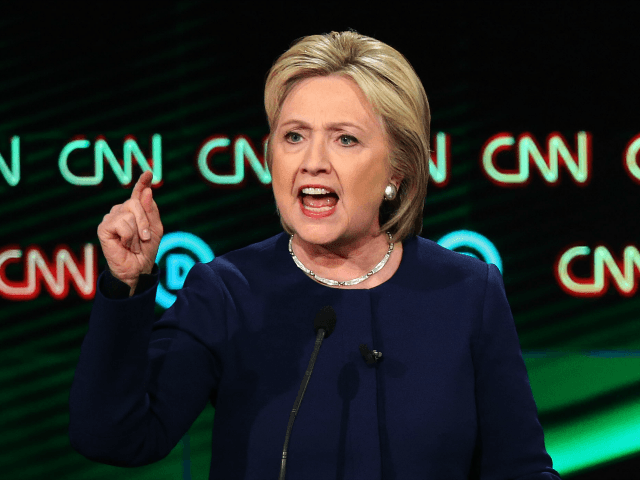MoveOn.org, which supports Sen. Bernie Sanders’ campaign, has garnered 187,315 signatures for a petition calling for the Democratic Party nomination to be decided by popular vote and not by so-called superdelegates who are largely party insiders.
“That’s why we’re calling on all the Democratic superdelegates to pledge to back the will of the voters at the Democratic Party convention in Philadelphia” in July, states the petition.
Continues the petition:
Bernie won New Hampshire. And by a hair, Hillary won Iowa. In other words, there’s a long Democratic primary ahead, possibly fought all the way to the convention.
But there’s a problem: There are 712 superdelegates—made up of Democratic elected officials and other prominent party leaders—who have the power to tip the scales, potentially shifting the vote at the convention to whomever they choose. This process is undemocratic and fundamentally unfair to Democratic primary voters.
This was just one of several petitions initiated by the far-left group. Ben Wikler, Washington director of MoveOn.org, told the Huffington Post that “more than 380,000 MoveOn.org members have signed petitions supporting a simple principle: The Democratic nominee should be the person who wins the primaries and caucuses.”
“MoveOn members overwhelmingly endorsed Sanders for president, and we want him to win the most pledged delegates, become the nominee, and become president,” Wikler stated.
The George Soros-financed MoveOn.org is leading the anti-superdelegate activism as Sanders’ campaign has engaged in a separate effort to try to swing some of the superdelegates to its side instead of supporting Hillary Clinton. Sanders on Monday conceded that that effort likely will not succeed. Clinton reportedly has 469 superdelegates to Sanders’s 29.
“At the end of the process, frankly, if we are behind in the pledged delegates, I think it’s very hard for us to win,” Sanders stated during MSNBC’s town hall in Philadelphia on Monday.
Still, Sanders called for superdelegates pledged to Clinton to rethink their allegiances. “Hundreds of hundreds of superdelegates, parts of the Democratic establishment, voted for Hillary Clinton, or chose to come on board her campaign, before I even announced my candidacy,” Sanders said. “Those people have the right to rethink the decision that they made.”
Slate staff writer Jim Newell sees Sanders pushing for a contested convention in contrast to Clinton’s 2008 decision to drop out of the presidential race and instruct her delegates to support Barack Obama despite. This Obama being 350 delegates behind winning the majority on pledged delegates.
Newell opined:
Hillary Clinton in 2008 was a much different person than Bernie Sanders is in 2016. She was, and is, a party player, and taking her doomed fight to the convention in 2008 would have crippled her legacy within the party and her chances for running again in the future. Sanders, as the Clinton campaign likes to point out, is much less a party man, and he’s also in his mid-70s, meaning it’s highly unlikely that he would run for president again. What does he have to lose by contesting the convention other than the admiration of his peers, which he never had in the first place?
Newell envisions some light at the end of the nomination tunnel, suggesting that a contested convention might generate enough Democratic Party anger to “finally provide the impetus needed to kill off superdelegates.”
Frustration at the superdelegate process was also recently expressed by a former press secretary for the Democratic National Committee, who slammed the party’s convention rules in a radio interview last month with this reporter.
The existence of the so-called “super delegates,” who are mostly members of the Democratic establishment, has “twisted” and “perverted” the intention of primary and caucus voting and allowed for a “much less democratic process,” former spokesman Terry Michael said in the radio interview.
The DNC should consider changing the party’s nominating rules to temper the impact of unpledged delegates, also known as super delegates, he said.
Michael, the DNC’s former press secretary, is director of the Washington Center for Politics & Journalism.
Michael explained that superdelegates have “an unanticipated power. Because they comprise about 15 percent of the 4,500 or so delegates to the convention.”
He said establishment types have allied themselves with Clinton to help ensure that she gets the nomination regardless of whether Sanders wins in the primaries and caucuses:
They were supposed to – if there were a large field of candidates and nobody came into the convention with a simple majority – they were supposed to be able to select someone who would be electable in November. But what’s happened is that a lot of these super delegates are establishment Democratic party members and they aligned with Hillary Clinton. And that meant that Bernie Sanders, even if he was winning primaries and caucuses, was not getting the votes of these super delegates who were committing themselves in advance to Hillary Clinton.
Aaron Klein is Breitbart’s Jerusalem bureau chief and senior investigative reporter. He is a New York Times bestselling author and hosts the popular weekend talk radio program, “Aaron Klein Investigative Radio.” Follow him on Twitter @AaronKleinShow. Follow him on Facebook.
With research by Brenda J. Elliott.

COMMENTS
Please let us know if you're having issues with commenting.